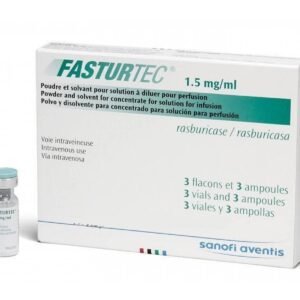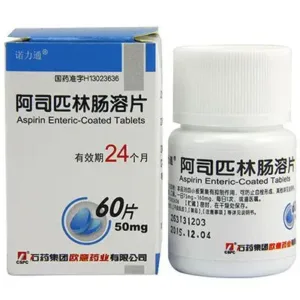:Inositol nicotinate tablets
Inositol Nicotinate Tablets are Western medicines and peripheral vasodilators used as adjuvant treatments for hyperlipidemia, atherosclerosis, and various peripheral vascular disorders.
Hyperlipidemia: When the levels of cholesterol (CH), triglycerides (TG), and low-density lipoprotein cholesterol (LDL-C) in serum are elevated and the levels of high-density lipoprotein cholesterol (HDL-C) are reduced, this product can be considered for dilating blood vessels and reducing lipids.
Atherosclerosis: When lipids and necrotic tissues continue to accumulate in the endothelium of arterial vessels and form plaques with a yellow porridge-like appearance, headaches, dizziness, vomiting, chest tightness, cold or numbness of the lower limbs, etc. can occur. This product can be used as an adjuvant treatment to improve physical discomfort.
Various peripheral vascular disorders: such as occlusive arteriosclerosis, acromial artery spasm, frostbite, vascular migraine, etc.
Read more
Add to Compare
Aluminium,Magnesium and Aspinin Tablets
Effects and efficacy: Unstable angina, acute myocardial infarction, local ischemic cerebrovascular disorder, etc. Aspirin is needed to inhibit platelet adhesion and aggregation, but the patient cannot tolerate the gastrointestinal reaction of aspirin.
Usage and dosage: Oral, usually once a day for adults, 1 tablet at a time; up to 4 tablets at a time depending on the condition.
Adverse reactions: Digestive system reactions manifest as nausea, vomiting, upper abdominal discomfort, abdominal pain, gastrointestinal ulcers, swollen lips, etc. Central nervous system reactions are mainly dizziness, excitement, headache, tinnitus and hearing loss. Allergic reactions manifest as rash, itching, asthma, angioedema, shock, etc., which can cause death in severe cases. Once an allergic reaction is found, seek medical attention in time. Other adverse reactions include dyspnea, low blood pressure, rhinitis, nosebleeds, etc. Once the above adverse reactions occur, it is recommended to seek medical attention in time.
Drug contraindications: Allergic to this product is prohibited. It is prohibited during pregnancy. It is prohibited for infants under 6 months old. Use with caution during lactation. Use with caution in liver and kidney dysfunction
Read more
Add to Compare
Apixaban Tablets
Effects and efficacy:
Apixaban is suitable for adult patients undergoing elective hip or knee replacement surgery to prevent venous thromboembolic events (VTE).
Usage and dosage:
The recommended dose of this product is 2.5 mg each time, taken orally twice a day, with water, and is not affected by meals. The first dose should be between 12 and 24 hours after surgery. When deciding the specific time point for taking the medicine in this time window, the doctor needs to consider both the potential benefits of early anticoagulation to prevent VTE and the risk of postoperative bleeding. For patients undergoing hip replacement: the recommended course of treatment is 32 to 38 days. For patients undergoing knee replacement: the recommended course of treatment is 10 to 14 days. If a dose is missed, the patient should take this product immediately and then continue to take the medicine twice a day. When switching from injectable anticoagulants to this product for treatment, it can be started from the next dosing time (and vice versa). If the patient cannot swallow the whole tablet, the product can be crushed and suspended in water or 5% glucose solution, or apple juice, or mixed with applesauce and taken orally in time. Alternatively, crush the product, suspend it in 60 ml of water or 5% glucose solution, and administer it promptly through a nasogastric tube. The crushed product is stable in water, 5% glucose solution, apple juice, and applesauce within 4 hours.
Drug contraindications:
Contraindicated if allergic to this product
Related dosage forms:
Tablets
Read more
Add to Compare
Aspirin
Function:
For the treatment of pain and inflammation in acute and chronic rheumatic diseases, such as rheumatoid arthritis, juvenile idiopathic arthritis, osteoarthritis and ankylosing spondylitis. It is used for the early treatment of cardiovascular diseases, such as angina pectoris, myocardial infarction, etc., and for the prevention of cardiovascular events in high-risk patients. Used to treat cerebrovascular diseases such as stroke.
Dosage:
For analgesia and antipyretic, take 0.3~0.6g each time, 3 times a day, once every 4 hours if necessary. Used for rheumatic diseases, anti-rheumatic: 0.6~1g once, 3~4g a day; chew when taking, and can be combined with calcium carbonate or aluminum hydroxide or Weishuping to reduce gastric irritation; a course of treatment lasts for about 3 months . Used to inhibit platelet aggregation and prevent myocardial infarction, arterial thrombosis and atherosclerosis, once a day, 75~150mg each time. The recommended dose for children is 80 to 100 mg/kg per day, divided into 5 or 6 doses. For children whose condition worsens rapidly, the dose can be up to 130 mg/kg per day if necessary. Aspirin involves many dosage forms, and individual conditions vary greatly. It is recommended that patients use it under the guidance of a doctor after seeking medical treatment for a clear diagnosis.
Drug contraindications:
If you are allergic to this product, use with caution during pregnancy. Use with caution during lactation. Use with caution when drinking alcohol.
Related dosage forms:
Aspirin enteric-coated tablets, aspirin effervescent tablets, aspirin tablets, aspirin powder, aspirin suppositories
Read more
Add to Compare
Betahistine Hydrochloride Tablets
Effects and efficacy:
Used for the treatment of inner ear vertigo, relieving symptoms such as vertigo, tinnitus, nausea and headache. Used for headaches caused by various reasons. Used for vertigo, tinnitus, etc. caused by chronic ischemic cerebrovascular disease, cerebral arteriosclerosis, head trauma or hypertension.
Usage and dosage:
Betahistine mesylate tablets: Oral after meals, 6-12 mg each time for adults, 3 times a day. Please follow the doctor's advice for details. Betahistine hydrochloride tablets: Oral. The usual dosage for adults is 4-8 mg each time, 2-4 times a day, and the maximum daily dose should not exceed 48 mg; or 5-10 mg each time, 1-2 times a day, and the maximum daily dose should not exceed 50 mg. Please follow the doctor's advice for details. Betahistine hydrochloride oral solution: Oral. 10-20 mg each time, 30-60 mg per day, and the maximum daily dose should not exceed 50 mg. Please follow the doctor's advice for details. Betahistine hydrochloride injection: intramuscular injection, 10 mg each time, 1-2 times a day; intravenous drip, 10-30 mg each time, once a day, added to 5% glucose injection or 0.9% sodium chloride injection. Please follow the doctor's advice for details. Betahistine hydrochloride sodium chloride injection: intravenous drip. 500 ml each time, once a day, slow intravenous drip. Please follow the doctor's advice for details.
Drug contraindications:
Allergic to this product is prohibited. Children are prohibited
Related dosage forms:
Tablets, oral solution, injection, injection powder injection
Read more
Add to Compare
Dipyridamole
Function:
Prevention and treatment of chronic coronary circulatory insufficiency. Used in combination with aspirin to prevent myocardial infarction. For use in coronary artery bypass surgery. For the treatment of disseminated intravascular coagulation.
Dosage:
This product is recommended for patients with thromboembolic diseases, transient ischemic attack (TIA) and ischemic stroke. The dosage is 25-100 mg once, 3-4 times a day (sustained-release preparations are best, 200 mg once, twice a day), combined with low-dose aspirin (25 mg). For the prevention of thrombosis after artificial valve replacement: 400mg a day, taken in 3 divided doses (combined with warfarin). For coronary heart disease: 25-50mg once, 3 times a day. For extracorporeal circulation to prevent platelet aggregation: 400mg/d, 3 times divided starting 2 days before surgery. For dipyridamole test: intravenous injection, 0.142mg/(kg·min) based on body weight, injection time is 4 minutes. (Except for glucose, this product must not be mixed with other drugs for injection.) Note: When treating thromboembolic diseases, the daily dose of this product should be no less than 400 mg, taken orally in 4 times, otherwise the antiplatelet effect will not be obvious; when used in combination with aspirin The dose must be reduced. For example, if aspirin is taken orally 1g per day, the amount of dipyridamole should not exceed 100mg per day. New clinical uses for herpes zoster: Oral administration of 30 mg of this product, 3 times a day, and 0.2 g of cimetidine, once every 6 hours. The two drugs have a synergistic effect. Chickenpox: Use 3-5mg/(kg·d) of this product, 2-3 times divided into three doses, one course of treatment every 3 days. Combined with intramuscular injection of vitamin B 0.1 mg, once a day. Urticaria: Take 100 mg of this product orally, 3 times a day (reduced dose for children), combined with vitamin C 100 mg, 3 times a day. It usually takes 3 days for acute cases to take effect, and 3-15 days for chronic cases. Henoch-Schonlein purpura: Under conventional treatment, adding this product at 2.5-5 mg/(kg · d), divided into 2-3 doses, can improve the cure rate. Mumps: 3 mg/(kg·d) of this product, 3 divided doses, combined with vitamin B130 mg, 3 times/day. Infant autumn diarrhea (rotavirus enteritis): 3-5 mg/(kg·d) of this product, 3 divided doses, combined with vitamin B 0.5 mg/d, 3 divided doses. Fluids should be rehydrated at the same time.
Drug contraindications:
If you are allergic to this product, do not use with caution during lactation. If you have liver function, use with caution in children under 12 years old.
Related dosage forms:
Tablets, dispersible tablets, injection
Read more
Add to Compare
Dotinorad tablets 多替诺雷
أقراص دوتينور
أدوية حمض اليوريك
دوتينوراد (الاسم التجاري: يوليكس) هو دواء يزيد حمض اليوريك.
في 22 يناير 2024، أعلن الموقع الرسمي لمركز تقييم الأدوية (CDE) التابع لإدارة الغذاء والدواء الحكومية في الصين عن قبول طلب تسويق Eisai لأقراص دورتينور المقدمة تحت تصنيف التسجيل 5.1. [1]
اسم الدواء: أقراص دوتينور
الاسم الأجنبي دوتينوراد
الاسم المستعار: يوليسي
المؤشرات الرئيسية فرط حمض يوريك الدم
يستخدم لعلاج فرط حمض يوريك الدم والنقرس.
Read more
Add to Compare
enarodustat tablets
Indications: Treatment of anemia in adult patients with chronic kidney disease who are not on dialysis.
02
Dosage and Administration:
Recommended starting dose: Adults with chronic kidney disease who are not on dialysis usually take 2 mg of Enadostat as the starting dose, once a day, orally before meals or before bedtime. The dose can be appropriately increased or decreased according to the patient's clinical condition, but the maximum dose should not exceed 8 mg once. If you miss a dose, you do not need to make up for it, and you should take the next dose at the regular medication time.
Dose adjustment: During the initial treatment phase, it is recommended to monitor hemoglobin levels once every 2 weeks until the target range is reached and maintained stable, and then monitor hemoglobin once every 4 weeks.
Read more
Add to Compare
Product Categories
- A الهضم والتمثيل الغذائي
- B تداول البلازما
- C نظام القلب والأوعية الدموية
- D الاستعدادات الجلدية
- DR\MR المطور المحسن
- E أدوية الجهاز المكونة للدم
- F نظام الدماغ القحفي
- G الجهاز البولي التناسلي
- H الاستعدادات الهرمونية
- K الهرمونات الجنسية
- M الجهاز العضلي الهيكلي
- N أدوية الجهاز العصبي
- O الأدوية المساعدة للأورام
- P مضادات الديدان
- R الجهاز التنفسي
- S الفم والعينين والأنف والأذنين
- Vترياق التسمم
- W الحد من البرد والحمى
- X أمراض معدية
- أدوية الأورام
- الأدوات الطبية
- الأدوية المضادة للعدوى
- السواغات الطبية
- الطعام الصحي
- منتجات الصحة الجنسية
Filter by price
Brands
Selected static block was removed or unpublished









